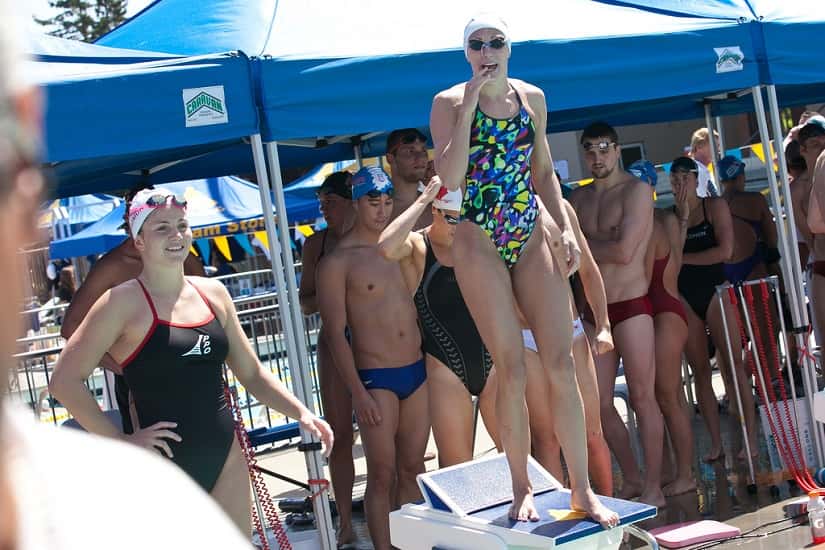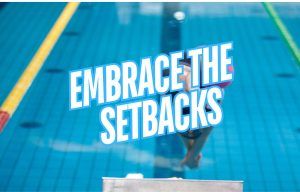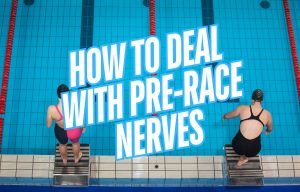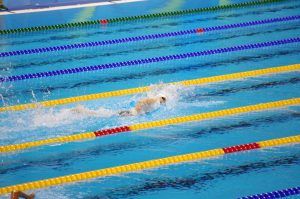
6 Benefits of Visualization for Swimmers
Wondering what visualization can do for your swimming? Here are some evidence-based benefits of visualization for swimmers for more confidence, less choking, and even better technique.

Swimmers all experience varying amounts of anxiety before big races. Here’s a simple tool to help calm and center yourself when it matters most.
The pool deck is numbingly cold below your feet.
Looking around you see the competition, confidant, loose, and smiling. They looked awfully fast during prelims.
Your coach is pacing nervously, slapping the heat sheets, rolled up so tightly it resembles a drum stick, into the palm of his hands.
Your mom is in the stands probably chewing off her nails one by one like a type-writer.
The college coach you have been emailing with is in the stands too, here to check out your swimming.
Drowsy, chlorinated applause fills the pool as the consolation final wraps up before you.
You step up on the blocks, but your focus is everywhere but where it should be.
There’s nothing more you want in the world than to swim a best time. To perform to how hard you have worked in those countless swim practices.
When you dive in the water things feel wrong from the get-go. Your feel for the water isn’t as good as it should be. Your dolphin kicks on the breakout feel flailish. When you take your first breath you realize the swimmer next to you is already a half body length ahead of you.
By the time you turn for the last lap, any excitement to race has long sailed over the horizon.
At this point, you just want to finish the race, get out of the water, pack your little red wagon and go home.
Choking or succumbing to our pre-race anxiety happens to all of us at some point.
The first time we race against one of our idols. The first time we step on deck at Trials. Our first solo international race.
We get so excited, so nervous that we forget our race plan and preparation and instead focus on all the worst possible outcomes and the externals which we don’t and can’t control. How effortless the competition performed. What that college coach will think of our swim.
These kind of swims, where everything should go right, but doesn’t, leaves us with shattered confidence and lowered expectations.
Choking, like anything else in the water, becomes a learned and habitual behavior. We learn to accept that this is the way it is, we will always be this way, and that it thoroughly, utterly sucks.
So how do we go about fixing this?
How do we become the swimmer who works their butt off at practice and has it show up in competition?
Well, first we need to understand high performance swimming requires the ability to manage our anxiety and excitement.
Too much of it and we burn ourselves out and get overly tense before we dive in the water. Too little of it and we don’t get the benefits of added blood flow, adrenaline and oxygen to our muscles that comes from being nervous and fired up.
And while the feeling of choking can leave us feeling really helpless, there are some things you can do to dramatically reduce the effects of being too nervous before a big race.
A series of studies have shed some light onto one tactic swimmers can use in order to confront their fears, calm anxiety, and increase performance.
And all it requires is a piece of paper and a pen.
During a series of four different studies researchers took a group of students and had them write out a math exam.
In order to elevate the stakes and ramp up the pressure, the students were told that they were going to be given cash prizes for performing well. On top of that, just to totally make sure the pressure needle was firmly red lined, the students were also to be filmed and that the results would be shared with their families and friends.
Fun!
Half the students were instructed to write a quick essay based on what they were experiencing in thoughts and feelings about writing the test. The other half, the control group, were told to write about a random event from their past.
The group who wrote about how they were feeling, particularly their fears and anxieties, significantly boosted test scores.
Which makes sense, if you think about it:
Journaling outlines your fears.
We don’t really give much thought and detail to our fears and anxieties.
We accept them as they are, and figure that since we feel it, and that we wouldn’t feel something for no reason, that our fears are justified.
Writing them down brings them out of the darkness, and you end up having to give written justification for them. Only, as it usually turns out, our fears and anxieties are a little farfetched.
Writing them out, and seeing them on paper, gives us the perspective to realize that they are over-blown. This allows us to take a breath, relax a little, and get down to business without the unnecessary anxiety and fear dragging off our shoulders.
1. It’s mega accessible. As far as mental training techniques go, this one is as fool-proof as they come. Pen, paper, a few minutes of your time.
The students who saw improved results did their journaling ten minutes before the exam, but there’s no reason you could do it the night before your big race, or whenever else you feel the creepy crawlies of anxiety taking over your optimism and focus.
2. Doesn’t require practice. Unlike a lot of other mental training aspects of the sport, from mastering your self-talk to incorporating visualization to your swimming, this one doesn’t require practice to master and use.
There’s no right or wrong way to do it, just sit down, put pen to paper and mentally barf the anxiety you are feeling on the page.
Which means that you can do it to improve your swimming today, tomorrow, or next weekend.
6 Benefits of Mental Training for Swimmers. Not sold on the benefits of improving your mindset? Here are just some of the reasons to give it a look.
7 Things You Can Do Today for a Better Practice Tomorrow. Want to get ahead of tomorrow’s workout? Here are 7 simple things that you can do today to make sure tomorrow’s practice goes down like a cool glass of success.

Olivier Poirier-Leroy Olivier Poirier-Leroy is the founder of YourSwimLog.com. He is an author, former national level swimmer, two-time Olympic Trials qualifier, and swim coach.
✅ Free shipping on Orders over $49
✅ Price Match Guarantee
✅ Best selection of gear for training and competition
✅ Fast and Easy Returns

“This is the best book I have ever seen concerning mental training.” — Ray Benecki, Head Coach, The FISH Swim Team


Wondering what visualization can do for your swimming? Here are some evidence-based benefits of visualization for swimmers for more confidence, less choking, and even better technique.

Ready to uncork some best times at your next swim meet? Here’s what you need to know to prepare for a swim meet.

The right mental skills can help you unlock faster swimming on race day. Here is a look at the right skills to use for competition.

Frustrated with setbacks in the pool? Here are some tips for improving your ability to embrace setbacks and swim faster.

Struggling to swim fast under pressure? Here are some tips for how to manage pre-race nerves on race day.

Swimmers often find themselves stuck with doubt when it comes to doing tough things in the water. Here’s a simple question to ask when you find doubt and uncertainty stopping you from excellence.
SITE
SHOP
GUIDES

LANE 6 PUBLISHING LLC © 2012-2025
Join 33,000+ swimmers and swim coaches learning what it takes to swim faster.
Technique tips, training research, mental training skills, and lessons and advice from the best swimmers and coaches on the planet.
No Spam, Ever. Unsubscribe anytime.
